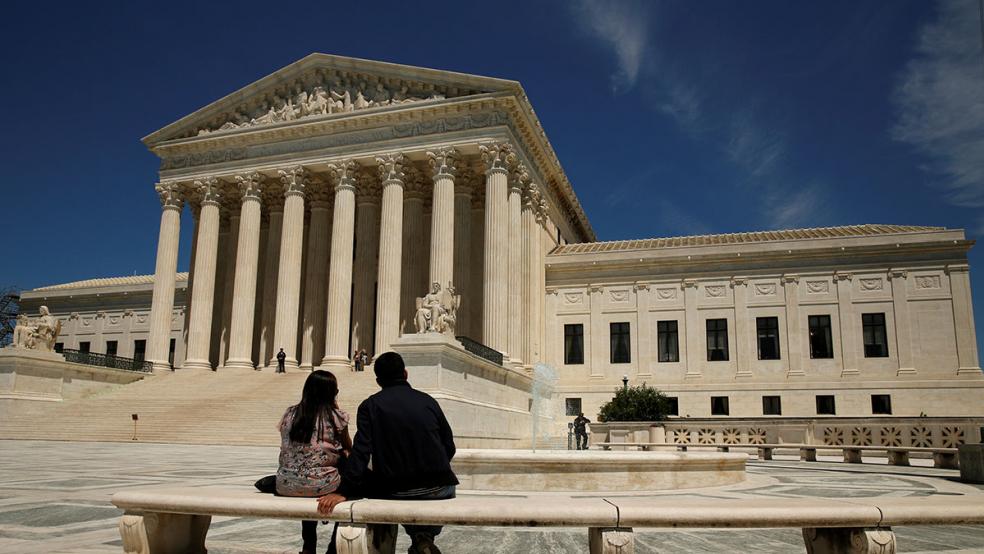In a move aimed at shoring up his support among conservative Republicans who remain unconvinced of his commitment to their values, Donald Trump on Wednesday released a roster of 11 federal judges. He said he would use the list as a "guide" for selecting Supreme Court nominees if he is elected president. However, the move fell short of an earlier promise that he would "100 percent" commit to actually selecting a judge from that list.
The makeup of the Supreme Court is of overriding importance to the conservative movement because if it is dominated by conservatives, it serves both as a bulwark against a more liberal executive or legislative branch and because the courts have increasingly become the vehicle of choice for both conservative and liberal efforts to mold social policy to fit their beliefs.
Related: Trump Announces Net Worth -- ‘Look at Me! I’m Rich’
Conservatives’ concern about the future of the court surged to crisis levels in February with the sudden death of Justice Antonin Scalia, a stalwart of the court’s right wing. Senate Republicans have been blocking President Obama’s nomination of Judge Merrick Garland to fill Scalia’s spot in the hope that a Republican would be elected president in the fall, and would support another strong conservative to the court.
Trump is keenly aware that much of the reluctance many in the Republican Party felt about backing him early in the primary season is that his apparent conversion to the conservative cause came relatively recently and doesn’t appear to be complete. Particularly on social issues -- from abortion to gay marriage to gender identity issues -- Trump has struggled to keep his comments in line with conservative doctrine.
His release of the list today partially fulfills a promise he made in March to telegraph his intentions with regard to a Supreme Court nominee. Speaking in Palm Beach at the time, he said, “I am going to give a list of either five or 10 judges that I will pick, 100 percent pick, that I will put in for nomination. Because some of the people that are against me say: ‘We don’t know if he’s going to pick the right judge. Supposing he picks a liberal judge or supposing he picks a pro-choice judge.’”
On the list are: Steven Colloton of Iowa, Allison Eid of Colorado, Raymond Gruender of Missouri, Thomas Hardiman of Pennsylvania, Raymond Kethledge of Michigan, Joan Larsen of Michigan, Thomas Lee of Utah, William Pryor of Alabama, David Stras of Minnesota, Diane Sykes of Wisconsin and Don Willett of Texas.
Related: Mark Cuban -- Trump Is Wrong About Tech
While most of them are little known on the national stage, Pryor and Willet have both forged reputations as strong and outspoken conservatives. Pryor in particular has attracted fire from Democrats for his adamant anti-abortion position.
In a statement, Trump praised Scalia and said, “The following list of potential Supreme Court justices is representative of the kind of constitutional principles I value and, as President, I plan to use this list as a guide to nominate our next United States Supreme Court Justices.”
Iowa Sen. Chuck Grassley, who chairs the Senate Judiciary Committee and is largely responsible for the refusal to consider the Garland nomination said in a statement, “Mr. Trump has laid out an impressive list of highly qualified jurists, including Judge Colloton from Iowa, who understand and respect the fundamental principle that the role of the courts is limited and subject to the Constitution and the rule of law.
Related: The Ho-Hum Donald Trump-Megyn Kelly Interview Lacked Both Heat and Light
“Understanding the types of judges a presidential nominee would select for the Supreme Court is an important step in this debate so the American people can have a voice in the direction of the Supreme Court for the next generation.”
Trump appears to have relied heavily on right wing think tanks for his list of potential judges. Many have been recommended by groups such as the Heritage Foundation.
Whether conservatives will be satisfied by the move will depend very much on whether or not they believe Trump can be taken at his word.





